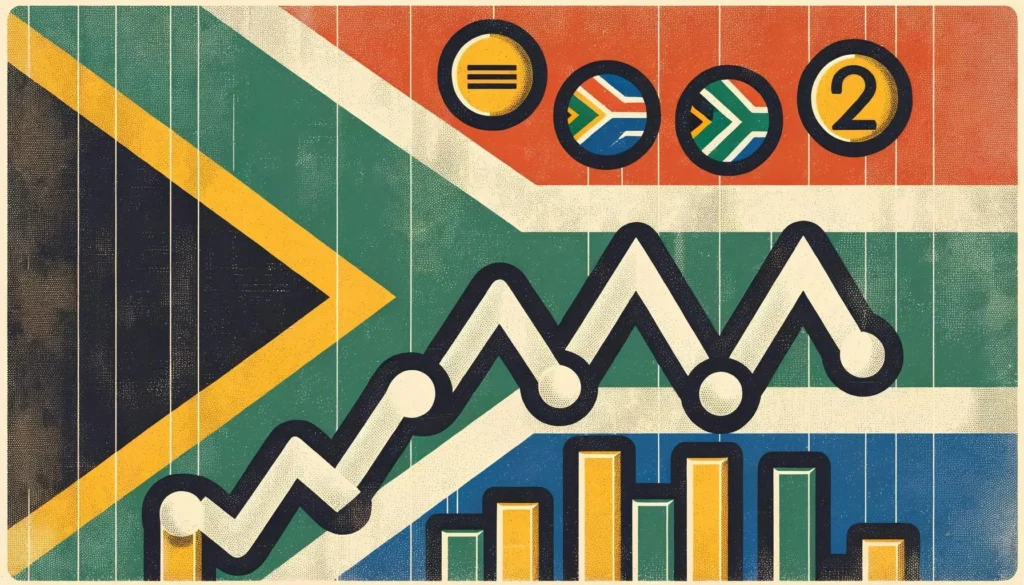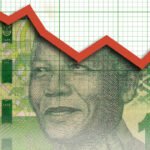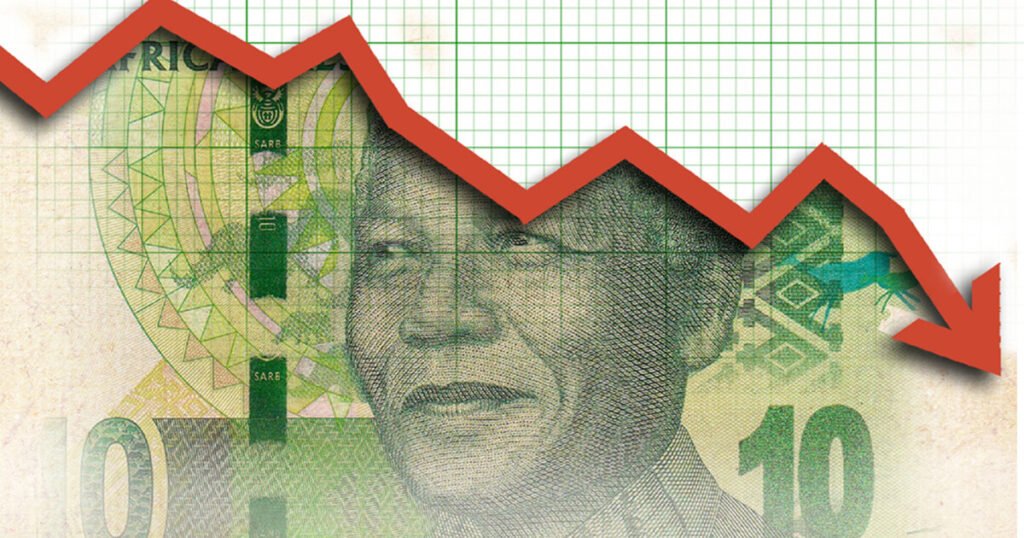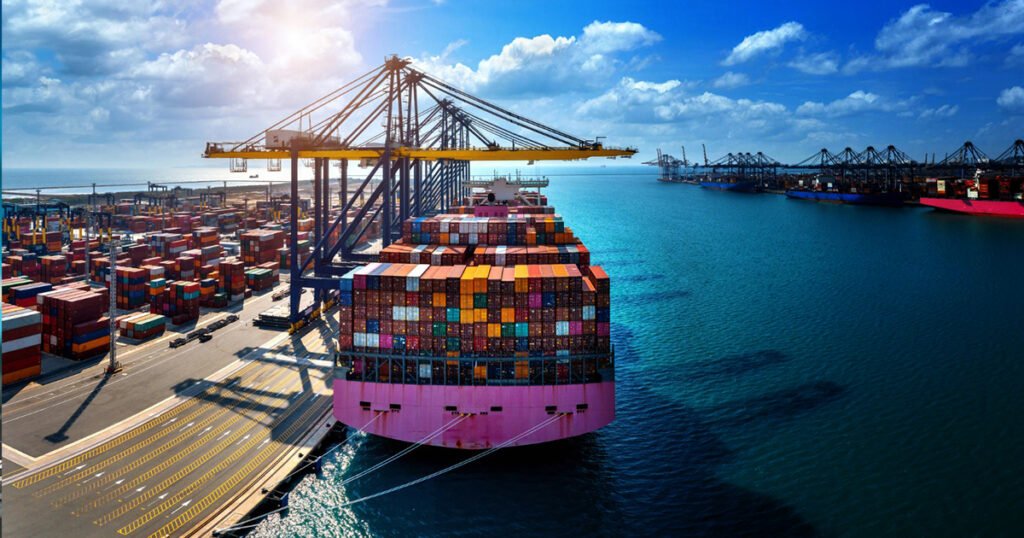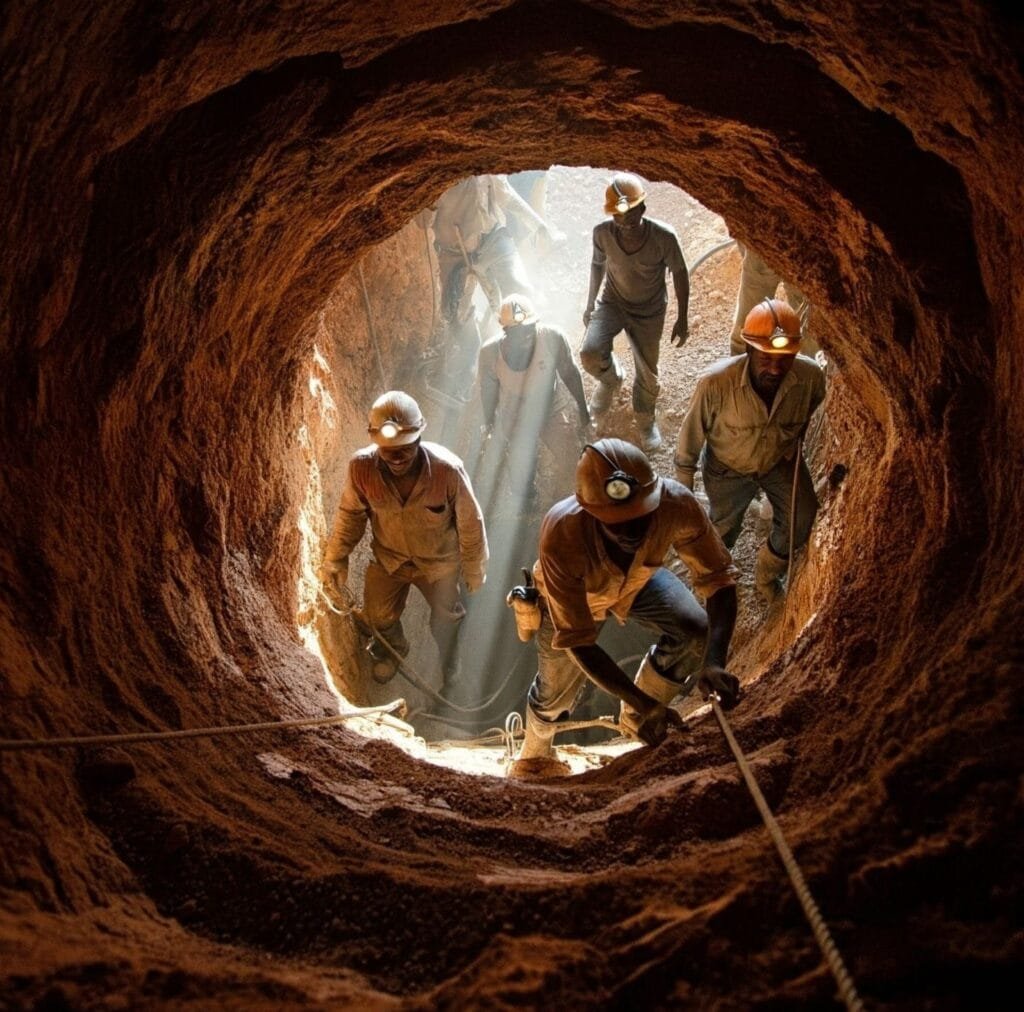South Africa’s fragile economic recovery suffered a major blow in recent days as global and domestic headwinds converged to shake investor confidence and depress key markets. A dramatic announcement from U.S. President Donald Trump—introducing sweeping new tariffs including a 31% levy on South African goods—was followed almost immediately by signs of instability within South Africa’s newly formed Government of National Unity (GNU).
Together, these developments have cast a long shadow over the country’s financial outlook, sparking a decline in the rand, a drop in equity prices, and a surge in sovereign debt risk. The Johannesburg Stock Exchange’s Top-40 index tumbled by 3.3% as traders reacted to both the external threat of reduced market access and the internal risk of a potential political breakdown.
The rand, already under pressure, fell as much as 2.6% against the dollar and breached its weakest level since January. The mood on the markets was one of nervous anticipation, as investors waited to see whether the country’s coalition partners—led by the African National Congress (ANC) and the Democratic Alliance (DA)—could survive their latest budget clash.
U.S. Tariffs Deliver a Harsh Blow
President Trump’s decision to impose a 10% baseline tariff on all U.S. imports, with higher rates targeted at specific nations, came as a shock to many in South Africa. With a 31% tariff slapped on South African goods, particularly in the auto, metals, and agricultural sectors, the country’s export-driven businesses now face significant hurdles accessing one of their most important trade partners.
South Africa exports billions in goods annually to the United States, including vehicles, iron and steel, aluminum products, citrus fruits, and precious stones. The new tariffs could lead to job losses in export-oriented sectors, higher costs for local producers, and reduced foreign exchange earnings. The government’s initial response—calling for an urgent renegotiation of trade terms—signals the seriousness of the situation.
The imposition of the new U.S. tariffs represents a significant setback for South Africa, dealing a blow to key export sectors and threatening jobs, foreign exchange earnings, and economic stability. In response, the country must urgently explore alternative trade partnerships to cushion the impact and maintain market access.
However, beyond these short-term measures, the most sustainable path forward lies in accelerating domestic reforms aimed at enhancing productivity, improving competitiveness, and building a more resilient, inclusive economy capable of withstanding external shocks.
The shockwaves were immediate. South Africa’s sovereign debt insurance costs jumped, with credit default swaps rising by 16 basis points—their highest level since April 2024. Market watchers noted that this was not merely a reaction to external pressure, but a compounding of risk signals already flashing within the domestic political arena.

A Coalition in Crisis
Just months after its formation, South Africa’s government of national unity is already under intense strain. The GNU was heralded as a breakthrough after the contentious May 2024 elections, ushering in a rare political arrangement that saw bitter rivals share power in the hopes of fostering national stability and good governance. The ANC, having lost its outright majority, was compelled to partner with the DA and other smaller parties to form a majority coalition.
Initially, the arrangement was met with cautious optimism. Observers hailed the unity government as a pragmatic compromise in a deeply divided nation, with the potential to catalyze real reform and rebuild public trust in institutions. However, that promise has begun to unravel, especially in light of a contentious budget vote that exposed deep ideological divides within the coalition.
The DA, South Africa’s second-largest party and a vocal advocate of fiscal discipline and private-sector growth, opposed the ANC’s latest budget framework, claiming it lacked transparency and failed to address inefficiencies. The party not only voted against the budget but also challenged the vote’s legality in court, raising the specter of a coalition collapse.
If the Democratic Alliance (DA) decides to withdraw from the Government of National Unity (GNU), the consequences could be profound, particularly for investor confidence and market stability. The formation of the coalition was initially welcomed by financial markets as a promising indication of political maturity and the possibility of greater policy coherence in South Africa.
Its collapse, however, would likely send the opposite signal—suggesting renewed political instability, deep-seated divisions, and a return to unpredictable governance—potentially triggering capital flight, weakening the rand further, and dampening the country’s economic outlook.
Investor Confidence in Jeopardy
For investors, the risk is not just that South Africa’s economy is facing external trade shocks—it’s that the country’s political architecture may no longer be capable of responding effectively. The GNU was seen as a stabilizing force, introducing diverse voices and checks on power, but the growing rift between the ANC and DA has eroded that narrative.
International investors and credit ratings agencies are now closely watching developments, worried that an unstable coalition may delay or derail key structural reforms. These include Operation Vulindlela—a flagship economic initiative jointly managed by the Presidency and National Treasury aimed at unblocking obstacles in sectors like energy, logistics, and water infrastructure.
The DA had reportedly lobbied for greater oversight over Operation Vulindlela in exchange for budget support, leading to increased tensions within the executive. Analysts worry that the potential for political brinkmanship will outweigh the imperative for collaboration, especially as the country enters another cycle of power outages and economic stagnation.
With the global economy already under significant strain and geopolitical risks on the rise, South Africa finds itself in a precarious position where internal political disarray is a luxury it simply cannot afford. At a time when stability is essential for attracting and retaining investment, the current climate of uncertainty undermines confidence.
Investors are increasingly seeking environments that offer predictability, transparency, and accountability—factors that are becoming scarce amidst ongoing coalition tensions and contested policy directions. Without a clear and unified political front, South Africa risks further alienating global investors and jeopardizing its economic recovery prospects.
The cost is already being felt in hard numbers. Capital flight from equities and bonds has accelerated, with yields on long-term government securities widening. Foreign direct investment, already in decline, may slump further unless stability is restored quickly.
Structural Reforms Under Threat
One of the critical risks emerging from the GNU crisis is the potential derailment of long-overdue structural reforms. Many of the most urgent reforms—such as restructuring Eskom, professionalizing the public service, and reforming land ownership policies—require both political consensus and administrative follow-through. The GNU was supposed to be the platform to deliver this, but so far, progress has been limited.
On public service reform, both the ANC and DA had initially agreed to reduce political interference in civil servant appointments. A new Public Service Commission Bill was passed to professionalize recruitment processes. However, legal disputes and policy disagreements have stalled its implementation. The ANC’s continued insistence on cadre deployment—placing loyalists in key government roles—remains a sticking point.
Similarly, education and healthcare reforms have been caught in the crossfire. The DA supports the retention of private medical aid schemes, while the ANC wants broader universalization. While compromises have been reached in principle, practical implementation has been elusive.

The lack of cohesive policy execution is already being reflected in South Africa’s growth figures. The economy remains trapped in a low-growth cycle, with unemployment stubbornly above 30%. Youth unemployment is even more dire. Without bold reforms, experts fear the country could experience a decade of stagnation.
A Call for Pragmatism and Renewal
Despite the gathering clouds, many observers still believe that the GNU represents the best shot at national renewal—if the coalition partners can recommit to pragmatic cooperation. South Africa’s democracy has endured enormous strain before and emerged stronger, and there is a growing chorus urging the current leadership not to squander the opportunity.
Civil society organizations, business leaders, and even religious institutions have begun advocating for a national consensus conference to address the most divisive issues and reframe the GNU’s agenda. The hope is that, by creating new channels for negotiation, South Africa can move past gridlock and into a phase of inclusive development.
For its part, the private sector is urging swift action to restore investor confidence. This includes calls for a unified response to the U.S. tariff issue, the swift resolution of the budget impasse, and clear communication on the direction of key economic policies.
Time, however, is running short. With global markets becoming more volatile and geopolitical rivalries intensifying, South Africa must act decisively if it hopes to regain momentum.

Between Crisis and Opportunity
The dual challenges of external economic pressure and internal political fragility have placed South Africa at a critical crossroads. While the present moment is fraught with risk, it also offers an opportunity to reset the country’s political and economic trajectory.
If the GNU survives its current test, it could re-emerge stronger and more focused, with a renewed mandate to deliver real reform. This would require maturity from all political actors, a suspension of ideological rigidity, and a shared commitment to national progress over party interest.
On the global stage, South Africa must also rethink its trade strategy, expanding its market access in Africa, Asia, and Latin America while strengthening local industrial capacity. Tariffs may be painful, but they also present a chance to diversify and deepen economic resilience.


